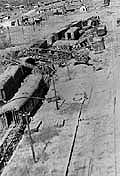Inchon, Ajinamoto and the Black-market
The selling of imported materials in the Korean market place which had been brought to Korea
by military aircraft was considered black market and the penalty for such crime was severe. But
there was much profit to be gained and few were ever caught--at least few were known to Cpl.
Bill Keeney and myself. And we needed the cash. We got into the business mainly because we
had the connections and we knew what the Koreans most wanted. They craved a meat tenderizer
known in the Far East as Ajinamoto. It softened dog meat to the point it was chewable. But it
was a Japanese product and difficult to move from one country to the other. All we had to do
was get a few hundred cans of it to Kimpo Air Base (K-14) and lots of money would be ours.
It seems that Bill and I were both due for some R&R (rest and relaxation) in Japan in October
1951 and were scheduled to go together. This was a dangerous combination of guys because,
when paired, we often flirted with wrist chains and dark disaster.
Knowing we were headed for the Ginza, we checked the purchase rate for Ajinamoto in the local
Korean village and found it at one US dollar per can. Enlisted people returning from Japan said
the miracle powder could be purchased by the case for about $100; or 10 cents each. We counted
up our combined savings and set our sights on the purchase of 2,000 cans.
Next, we arranged with a friendly RB-26 pilot from the Wing who would be there at the same
time to bring back to K-14 what he believed to be "souvenirs" inside his bomb-bay. For his
troubles, we agreed to give him several bottles of hard-to-get American whiskey.
In the middle of our Tokyo visit, (this particular visit is a story in itself) we met the Ajinamoto
sales rep and had him bicycle deliver our 2,000 cans to the base where our RB-26 was being
serviced. The pilot allowed the boxes to go onboard and several days later the ammo boxes sat
on the Kimpo tarmac waiting our return.
As soon as our C-47 transport stopped beside the Kimpo passenger tent, Bill and I scurried about
until our boxes were located. We hastily loaded them on the back of my Public Information
Office jeep and drove directly to our tent. Once inside, we cracked them open and counted what
we expected to be new-found wealth. The box was like dug up treasure, its shiny tin cans were pearls
and gem stones.
Several days after my return from Japan, Captain Donald Moats allowed me to take the jeep off
base to develop a story or two for release back home in the States. With my gate pass in hand,
Bill and I headed straight for Inchon where, we were told, the highest prices were being paid for
the infamous red powder.
Washing Clothes - Inchon 51
 |
On arrival, and expecting the merchants to line up with fists full of military script, we instead
faced stall operators more skilled at bargaining than we had anticipated. They wrinkled their
faces and pointed to shelves lined with cans of the tenderizer. None would pay the one dollar
we expected and all turned their backs on us as their unified show of refusal. We were broke,
had a Jeep stuffed with illegal black-market items, and were a long way from Kimpo. What to
do?
Bill, being the more aggressive of us, decided to end the standoff by grabbing the first merchant
(the smallest one, perhaps the oldest, too) and make growling (threatening) noises. I watched
as the other merchants got the idea the sale would be made--one way or the other--and I was
very surprised to see them step forward and fan out their military script. The 2,000 Ajinamoto
cans disappeared into the busy market place without further discussion.
It was now late and a very cold Korean afternoon and we had twenty miles to drive before
reaching the Kimpo gate. We had to move quickly and be off the road before dark because of the
curfew. With the money stuffed into our grenade pockets, we took off in a whirl of dust. Near
the edge of Inchon, we stopped for a few minutes to compute our nefarious earnings. It was on
the shoulder of the dirt road we found why the merchants had been so willing to conclude the
sale. They had simply used Bill's physical subterfuge to give us what they had offered in the
first place: eighty cents per can. Bill's smile disappeared as he looked over at me with all the
anger he could muster. He'd been out-maneuvered and he was not a happy GI.
Further on, we were stopped at a road check composed of Korean and US Army military police.
Their job to counter moves such as ours and to confiscate vehicles, equipment, money and to jail
any culprits they found. They were also looking for deserters from all the armies since the battle
zone was only about a few miles to the north.
We worked our way forward as one vehicle driver after the other successfully gave answers for
being in the area. Bill and I watched and listened trying to conjure up some response that would
clear our path. On both shoulders of the road soldiers watched the short train of vehicles for
suspicious behavior such as the dumping of contraband, turn arounds and the hiding of money.
Then it was our turn.
"Let's see your pass, Corporal." The military policeman held his hand out and I was thankful
Captain Moats had authorized me broad movement with the Jeep rather than his typical
directions of where I was to go and when I was to return. Bill sat motionless, his face sober. It
was one of the few times he wasn't smiling and he was letting my pass do the talking for the two
of us.
"Why Inchon?"
I mumbled something and swallowed a lot of spit.
The policeman stared hard into my eyes and I felt the money grow in size and begin to burst the
seams of my grenade pockets. I wished I had been given a check for the amount and not the
bundle one dollar military script notes. While they were small in size, they felt heavy and I
prayed he wouldn't order me to turn my pockets inside-out.
"I'm a writer," I said, "I write!" It sounded dumb and I was sure he saw through my facade.
Beside that, my voice was unusually high due to my nervousness.
The MP scowled and said something about writers being fags and most of them hailing from
California. I hoped he wouldn't ask me where I was from for I would have lied and said Arizona
or Texas.
The military policeman waved an associate over and instructed him to ride on the back of our
jeep and for me to drive to their headquarters. He advised there wasn't much of a problem but
they wanted to ask more questions. My stomach soured and Bill's face showed, for the first
time, worry lines. I had hoped we would be sailing down the road by now and I would be
listening to Bill laughing and bragging about how we had outsmarted the cops.
I swung out of the line of vehicles and headed back toward Inchon. It was now about three in the
afternoon and getting colder. I had sweat rings where they shouldn't be and I tried to dry them
away by elevating my arms as I drove.
The soldier was casual as we walked into the front door of the military police building and he left
us unescorted at the counter. To this point, we were treated as persons more lost than under
suspicion. Then the soldier came back and told us we could go inside and take chairs. A
technical sergeant looked up, showed no recognition for a moment, and went back to his singlesheet of paper.
"You guys involved in the black market?" When we didn't immediately reply he looked up and
calmly stared at our faces. "Well?"
Bill stammered something about being on an authorized trip and that we had the pass to prove it.
I briefly told him I was a writer and that I was getting background for several stories. I remember
mentioning Inchon as being one of the places I had chose to look.
"Yeah, I'll bet," he said, "and if I direct you to open those fat pockets of yours I suppose you and
your friend will say you've been gambling, too." The sergeant laughed and showed no inclination
to pursue the pocket inspection.
Neither Bill nor I got a chance to reply because the sergeant had better things to do and he
walked out of the small room. We heard him tell our MP passenger to escort us back to the road.
Before he was out of sight, he looked back and waved a fat hand.
"You two Air Force shirkers get your butts back to Kimpo. Do it now! Next time I see you,
you're going home in irons three decks below the waterline."
I believed him. Crime was not for me. I intended to get my Air Force shirking butt back inside
the K-14 fence and never again to venture out.
As soon as we were beyond the checkpoint and well beyond their hearing, Bill did let out a
holler-like laugh as he grabbed at the frame of the windshield and pounded his boots against the
floorboards. He was truly overjoyed, I was relieved, and Moats never heard a word of it. The
twenty cents loss per can came up later only when we were drinking. As time went on, it became
funnier and something we both enjoyed recounting.
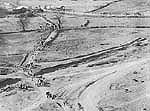 North Koreans Fleeing |
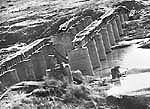 Bridge Interdiction |
Chinese - The War Drags On
By now, the Chinese Red Army was well into the war on the side of the North Koreans and they
were not making life easy for the United Nations. We at Kimpo felt the pressure applied by them
in a number of ways. First of all, demands for aerial pictures to be produced by our lab
increased markedly causing longer shifts with the same number of personnel. Second, were the
demands on the airfield itself.
On one particular day, I saw the last great air show of probably all wars with the fly over of
several hundred B-29 four engine bombers on their way from Japan and Okinawa to the Chinese
army front. Their targets were along the Yalu itself and their task to stop the flow of Chinese
into North Korea. The two air groups had come together somewhere south of Kimpo and, in
tight wing-to-wing formations, they passed overhead low enough for me to see their insignias.
I recall standing outside my field tent and seeing the black formations and hearing the powerful
drone of their combined engines. I watched history pass overhead as groups at varying altitudes
held their positions--perhaps like WW-II--and disappeared beyond the low foothills north of
K-14. Death flew with them that cold day for many of the air crews and for thousands of
soldiers on the ground.
Several hours later, I began hearing the first of the "May-days" from the returning planes, many
of them limping along barely hundreds of feet over the crests of low hills and villages. Those
coming to us for emergency landings were missing tips of wings, tails, and wheels, had holes in
their fuselages, and many spewed streaks of black smoke across the sky.
We in the 67th were responsible for taking pictures of aircraft problems occurring on the base.
The job was called, "Crash Camera" and several of us were trained to do a first-class
photographic investigation.
We, at first, thought the first "May-day" would be the sum total of our day's work. But as soon as
the first bomber had slid in on the metal grating and come to rest as a pile of useless aluminum
and wire, we realized many more might just be beyond our view.
As I recall, Staff Sergeant Mike Russo was "Crash Camera" at the time and he soon was being
supported by several others with Speed Graphics from the 67th laboratory.
CRASH !
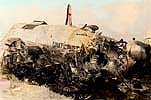 |
All-in-all, I believe we had six or seven "May-days" with each plane adding to the carnage on the
ground. I was there, too, but more as a helper wherever help was needed. My recall tells me
there were many bodies in the gun turrets and, occasionally one or both of the pilots of an
aircraft were wounded, dead, or dying. No B-29 bomber using Kimpo that day ever made it back
into the sky. They were down for good and most were just pushed aside and pressed into heaps
of crushed aluminum.
The sight of the carnage changed my perspective of war forever and more than a little of my
youth had left me by nightfall.
Later, we were told that every airbase in Korea received one or more of the derelicts of that final
great bomber run to the north.
States - Promoted, Rotated and Married
Bill Keeney, Jim Welk, and myself found ourselves a war and in a place where promotions were
slow and with little hope for going up in sight. We were all corporals for most of the Korean
Campaign and it wasn't until time to rotate back to the States that our third stripes
(or Airman First Class) came to the three of us.
Donald Moats, now a major and still in charge of the Wing's Public Information Office, called
me into the Quonset hut and announced I had become a sergeant. Staff Sergeant Russo was
there, too, and the three of us celebrated even though there was no alcohol available. Moats
handed me a set of stripes and told me to have the Korean momma-san sew them on that very
day. I wrote the date down because it was such a momentous occasion and one that I had given
up all hope of ever enjoying. It was the 15th of September, 1951. During the celebration, Major
Moats alerted both Russo and myself we were scheduled to return to the States in the very near
future.
Rumors had been flying for several weeks that most of us would be soon leaving Korea and from
Japan in mid-January, 1952. I wasn't sure I really wanted to go just yet: After all, it was the only
war I would ever be in and I wanted a bit more of it. Crazy as this may seem now to the reader,
the excitement of war was part of my needs and I felt let down that it would soon be behind me.
On the 30th of December, 1951, SP Order #287 reached the PIO office and was posted on the
hut's tiny bulletin board. It said that the below named personnel were being rotated from the 5th
Air Force, Korea and transferred to a receiving area in California. We were to leave Japan by
ship on the 13th of January, 1952 and would arrive in San Franciso on or about the 29th of the
same month.
I was again with friend, Jim Welk, for another epic event and this time on the SS J.C.
Breckinridge. It left Yokohama right on schedule but instead of going straight across the Pacific
as we thought it surely would, it headed south to Okinawa. It was announced it was scheduled to
pick up several hundred metal caskets of our war dead.
From San Francisco, I was dispatched to Wichita, Kansas and to a newly opened airbase. I still
had about two months to go on my four year service and had decided to make the most of my
time remaining before hanging up my uniform. After all, I was still in a Public Information
Office and writing stories; life was going to be easy and very uncomplicated, I was certain.
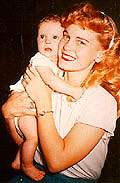
As fortune would have it, I chanced to see a pretty blonde girl with blue eyes working for the Wichita City Airport manager in the next office to mine and my two months became a period of my life I shall never forget. Complications set in immediately and everything I did or thought about was dominated by the blonde with the blue eyes. I couldn't sleep and my eating habits changed, too. The hardness that war had driven into me slid away like so much jelly. I was in love.
But then, she is yet another story. It shall suffice to end my Korean experience by writing I was
honorably discharged on the 3rd of June, 1952 and married the former Ms Freda Marie Simon on the 5th.
--------------------
Jack Morris
